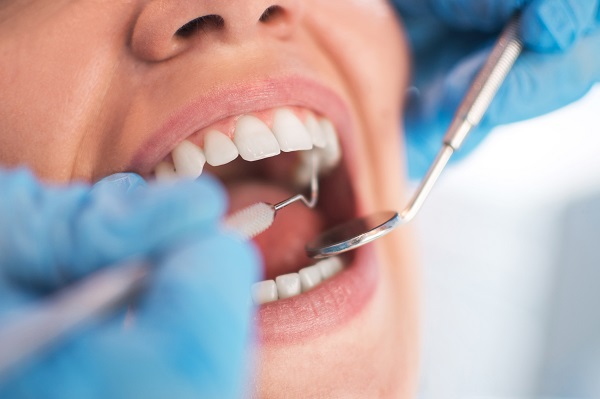What Happens During an Oral Cancer Screening?

Thinking about getting an oral cancer sceening? Oral cancer screenings are a very important part of general dental care as they ensure the health of patient's oral cavity. They involve a few steps that are typically painless. Understanding the process of an oral cancer screening can be helpful for patients who are not sure what to expect. Keep reading to learn more.
What goes on during an oral cancer screening?
Below is an outline of what to expect during an oral cancer screening.
The oral cancer screening process
An oral cancer screening will include three main parts:
- Physical examination of the oral cavity: The dentist will use a gloved hand to feel around the patient's mouth. The soft tissues and gumlines will be felt to check for lumps or bumps that may indicate a warning sign. The dentist will carefully perform this part to ensure there is nothing abnormal
- Visual examination of the oral cavity: The visual part of the oral cancer screening is similar to a check-up visit, however, it wil be much more detailed. The dentist will carefully inspect each tissue in the mouth, looking for any spots or patches that indicate oral cancer. Usually, the spots are red or white, however, some may be darker in color, such as brown or black
- Additional tests: Some oral cancer screenings include additional tests that rely on the use of dye or a laser. If the visual and physical part of the examination indicates anything slightly abnormal, the dentist may apply a dye to check for oral cancer. Additionally, a laser may be used to perform a biopsy, which tests for oral cancer cells
The steps listed above may vary per patient; however, for the most part, these are the general guidelines of an oral cancer screening.
Other things to know
It is important to know that some people are more prone to oral cancer than others, which may necessitate more frequent screenings. For example, individuals that smoke tobacco or consume a lot of alcohol are especially at risk. Additionally, those that have family genes of cancer may pose a higher risk. Individuals that are at higher risk should talk with the dentist to determine what preventive measures can be taken. The dentist may suggest frequent oral cancer screenings, extra oral hygiene, and avoiding super sun exposure.
Oral cancer is often treated with surgeries, medication, and sometimes chemotherapy, all of which are necessary in order to prevent the cancer from spreading to other parts of the body where it could get worse.
Ready to schedule an oral cancer screening?
Individuals that want more information on oral cancer screenings and what they entail can consult directly with a general dentist to learn more. The dentist can provide detailed information on the importance of screenings. Additionally, the dentist can answer questions and go over concerns about the process. Reach out today to find out more or to get scheduled for an appointment.
Request an appointment here: https://www.keydentalarlingtonheights.com or call Key Dental at (847) 255-8439 for an appointment in our Arlington Heights office.
Check out what others are saying about our dental services on Yelp: Oral Cancer Screening in Arlington Heights, IL.
Recent Posts
Red, inflamed or swollen gums are often the sign of gingivitis, the first stage of periodontal disease or worse still, periodontitis. Plaque is the most common cause of the condition, but there are several others that can cause gum infection.The following are some of the common ways to get gum disease:Gum disease is usually caused…
There has been a lot of talk about dental implants in recent years. Dentists recommend them, and patients benefit from the results of the treatment. Implants restore the full function of the mouth and revitalize smiles. People can enjoy newfound self-esteem and the self-image and health they have been looking for. You may wonder whether…
When your mouth has been worn down due to years of wear and tear, dental restoration can help you get your smile back and improve your oral health. Even if we do not think about it, we rely on our teeth, tongue, gums, jaw, and throat for more than we realize, and keeping all these…
A dental crown can protect the remaining dental structure. It can restore and protect the natural tooth. Maintaining this restoration can help keep your smile intact for a long time. Here are some care tips for your new dental crown.Specific foods can damage a dental crown. Some raw fruits and vegetables are firm and hard.…


